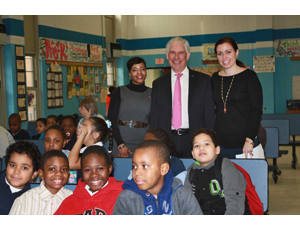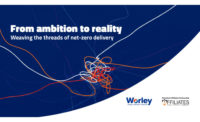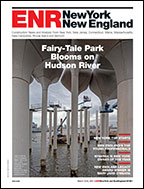
When Hanifa Johnson joined Maser Consulting, Red Bank, N.J., last year as a senior project engineer—along with technical and management skill, she brought a commitment to help the community in which she was raised and has worked—Newark, N.J.
Since 2011, Johnson had been the “local champion” in that city for Engineering Better Readers (EBR), a national pilot program begun by the Silver Spring, Md.-based Engineers' Leadership Foundation in which industry firms and their employees take leadership roles in local communities to incentivize students to boost reading in low-performing schools.
Johnson recently supervised this year’s launch of the EBR program at Newark’s Camden Street elementary school, which now involves weekly after-school reading sessions for pre-K through third-grade students.
Volunteer readers are practicing engineers from Maser and other design firms, as well as college students from the New Jersey Institute of Technology, Johnson’s alma mater.
Students are encouraged to read independently to earn points to purchase merchandise from the school store that is subsidized by contributions from design firm sponsors and from Target Corp., says engineer Jim Johnston, who helped organize the Newark program and is a board member of the foundation.
He says similar programs have also been launched in Denver, Houston and Briceville, Tenn.
“When I started with Maser, it only seemed natural to present the program and the concept and it was well received,” says Johnson, who adds that her new boss, company president and CEO Richard Maser, was also born and raised in Newark. “It is an opportunity for us to go full circle,” she says.
“Reading is fundamental to all learning. The sooner we get our children reading, the more prepared they are to understand, navigate, change and rule the world around them,” Johnson said in a Maser blog.
Linking engineers with reading is a natural, she says, and promotes the profession as a career choice to impressionable children.
“Until I went to NJIT, I had never met an architect or an engineer. There aren’t any in my family and they are definitely scarce in the inner city," says Johnson. "Engineers solve problems and reading is a fundamental part of the problem-solving process—one that needs to be instilled in all students at a young age.”
According to Foundation President Gerald J. Salontai, former CEO of engineering firm Kleinfelder: “Studies show that kids who do not master reading skills by the third grade have learning difficulties later and are far more likely to drop out before high-school graduation. This program is a great start in the right direction.”
Johnson says efforts in the Camden school have borne results, with nearly 100% of the participating students having raised their scores in every reading-test category in just a few months.
“Ultimately, I want these students to be able to ‘hold their own’ globally with the intent of one day reciprocating the support they have experienced with “Engineering Better Readers” to a future generation,” says Johnson.
“My classroom is like a revolving door. Throughout the school day, students continuously come in and out of my room displaying excitement for me to sign off on their completed book report summary forms,” says school literacy coach Joan Harris.
“In addition to the reading, the program reinforces math and technology concepts with the infusion of the Accelerated Reading program’s point system.”
In a thank-you note, Camden Street school student Dinasia Griffin told her college student reading mentor that she hoped he got a “really good job” when he graduated and that she wanted to become a “great college student like you.”
The Engineering Better Readers program is in need of more engineering firms and contractors to “champion” schools in the ENR New York region—and beyond.
For more information about the program and the Engineers Leadership Foundation, visit www.engineersleadership.org or contact Project Director Patricia Bain Bachner at info@engineersleadership.org or 301-588-6650.






Post a comment to this article
Report Abusive Comment